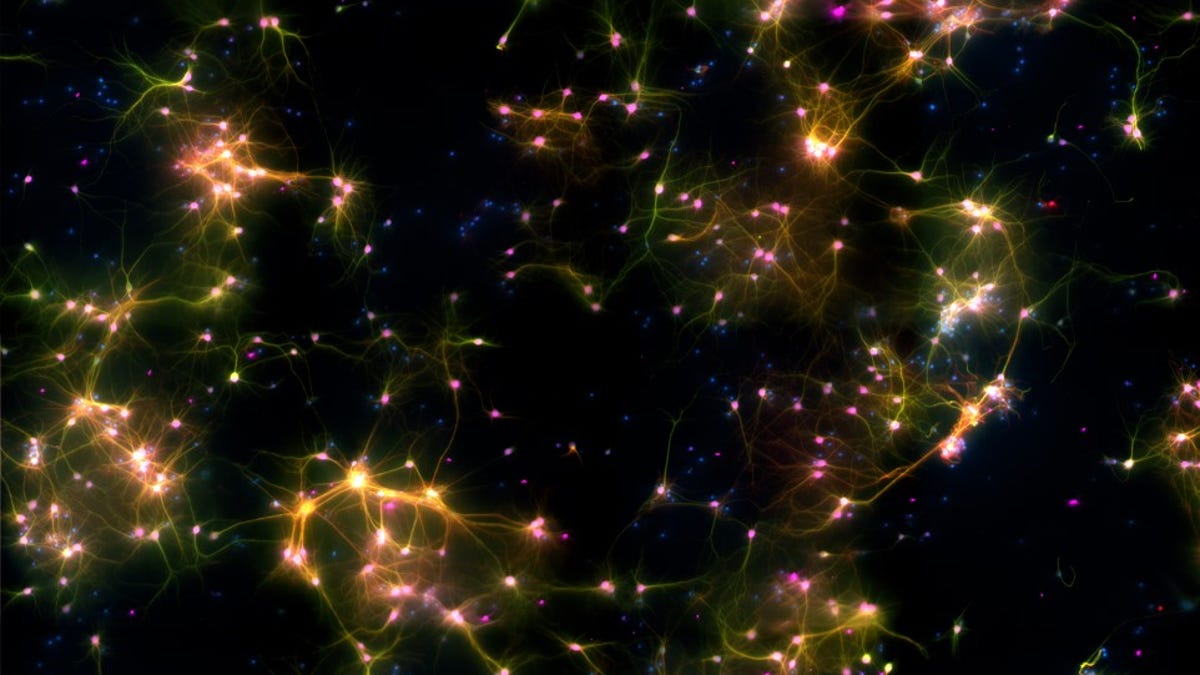Live Brain Cells Playing Pong in a Dish Could Illuminate Mind's Mechanics
Meet DishBrain.

DishBrain's neural cells seen under a microscope.
Scientists have created a gamer -- out of cells, in a lab.
An Australian-led team of researchers placed 800,000 live human and mouse brain cells into a dish, connected them to electrodes and a simulation of the classic game Pong. The scientists then watched as the mini-mind quickly taught itself the game and improved the more it practiced. They were able to follow along by converting the cellular responses into a visual depiction of the game that looks much like the original.
They call their system DishBrain, and say it proves neurons in a dish could learn and display basic signs of intelligence. The team details the new setup, dubbed synthetic biological intelligence, or SBI, in a study published Wednesday in the journal Neuron.
Eventually, the authors say, SBI could help unlock longstanding mysteries of brain mechanics and lead to better treatments for certain neurological conditions. "DishBrain offers a simpler approach to test how the brain works and gain insights into debilitating conditions such as epilepsy and dementia," says Hon Weng Chong, chief executive officer of biotech start-up Cortical Labs.
SBI could also offer an alternative to animal testing, which is often how scientists go about studying the viability of new drugs and therapies.
"We now have, in principle, the ultimate biomimetic 'sandbox' in which to test the effects of drugs and genetic variants -- a sandbox constituted by exactly the same computing (neuronal) elements found in your brain and mine," adds co-author Professor Karl Friston, a theoretical neuroscientist at University College London.
Artificial vs. biological intelligence
The study team found that biological intelligence, aka living brain cells, behave pretty differently than a computer might in terms of AI.
"In the past, models of the brain have been developed according to how computer scientists think the brain might work," says Brett Kagan, chief scientific officer of Cortical Labs and a co-author of the study. "That is usually based on our current understanding of information technology, such as silicon computing... But in truth we don't really understand how the brain works."
Interestingly, DishBrain naturally learned to play Pong out of an apparent tendency toward acting on its environment in ways that make it more predictable and less random. In other words, this system behaves much more like a real live brain than AI does.
For example, when DishBrain successfully returned the "ball" in Pong, that resulted in the system being able to better predict where it would move next. If DishBrain failed, it would lose the point and a new point would begin with the computer releasing a ball from a random starting place, and so on. Because DishBrain uses a feedback loop, it seems to get progressively better the more it plays.
"This is remarkable because you cannot teach this kind of self-organization, simply because -- unlike a pet -- these mini brains have no sense of reward and punishment," Friston adds.
Now Cortical Labs, an Australian biotech startup, is working on a new generation of biological computer chips to create a generalized form of SBI that, as the team writes in its study, "may arrive before artificial general intelligence due to the inherent efficiency and evolutionary advantage of biological systems."
"We know our brains have the evolutionary advantage of being tuned over hundreds of millions of years for survival," explains co-author Adeel Razi of Monash University. "Now, it seems we have in our grasp where we can harness this incredibly powerful and cheap biological intelligence."
The researchers also tried the system on other simple games.
"You know when the Google Chrome browser crashes and you get that dinosaur that you can make jump over obstacles (Project Bolan)," Kagan says. "We've done that and we've seen some nice preliminary results, but we still have more work to do building new environments for custom purposes."
Next up, the team has plans to show DishBrain a good time.
"We're trying to create a dose response curve with ethanol -- basically get them 'drunk' and see if they play the game more poorly, just as when people drink," Kagan says.
While we'll look forward to the results of the drunk DishBrain study, let's maybe keep those inebriated neurons far away from any self-driving car code.

